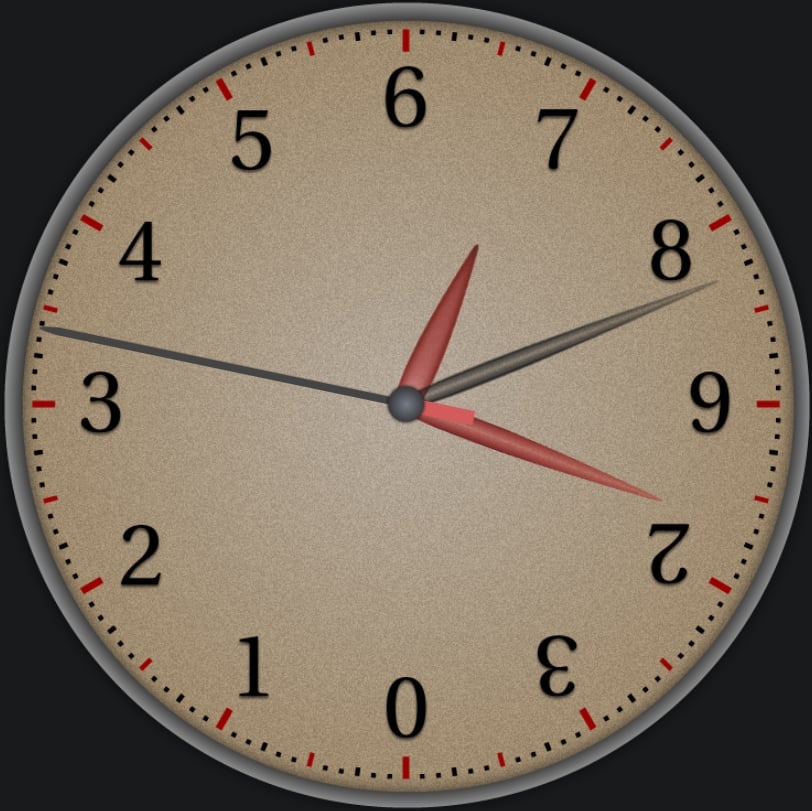Reposting bc I dun goofed before
I’m sure the artist intended to be smart and use metric time as something silly.
The problem is he used regular time.
60 * 60 * 24=86400=>86.4 kseconds where k stands for 1000. Like kilo for 1000 grams. Kilometer for 1000 meters etc.
The comic doesn’t make sense…
No, it’s correct, metric time is just using seconds for everything, you end up with minutes, hours, days,… as auxiliary units. And then there’s decimal time, which tries to divide the day into 10 hours, the French tried to introduce that during the revolution.
Yeah… That 10 hours thing made some heads spin…to the floor that’s it.
Are you talking about SI unites? I mean, sure, there is overlap but the metric system is what people use in everyday life and SI is a scientific system where you don’t even use prefixes (like kilo) but just powers of 10. In no case to people use kiloseconds
The SI system is a metric system and also defines the use of the words describing powers of ten. The use of kiloseconds also isn’t wrong, it just means 1000 seconds, obviously. But it only makes sense in context (for example short lived isotopes).
The same way “Megameter” is formally correct but no one uses it because there is rarely a context where this was useful.
I bet there is are least one or two kilo people who use it unironically.
Jokes aside, there is a different between a metric system and the metric system, and also between not wrong and right but at this point I’m just nitpicking that people shouldn’t be so nitpicky. Don’t take me serious.
I cannot see what’s wrong saying a day consists of 86.4 ks. It’s a fact and it’s mathematically correct.
If we’re redifining time, why do we have to keep the same unit size? Simply adjust the duration of a second to make exactly 100 ksecs per day.
deleted by creator
It’s ingrained and arbitrary. The only thing we’ve found so far for measuring time that doesn’t appear to be arbitrary is Planck time, which is so small it has no use in daily life. So if you have to use an arbitrary unit anyway, why make a new arbitrary unit? And while the second, minute, hour, and to a lesser degree month are arbitrary, days and years are not, they are just based on the unique circumstances of when we started observing our world in a scientific manner.
So if you have to use an arbitrary unit anyway, why make a new arbitrary unit?
Because whole point of metric is to use powers of ten.
12, 24, and 60 are highly composite numbers and easily divisible by more numbers than 10. Also, if you are doing that, go ahead and redefine degrees in a circle and all that jazz too. Go ahead.
There has been a “metric” measurement of angles for a long time. The radian. It’s pi based instead of 10 based, but it makes way more sense than degrees.
No, it really doesn’t
In the days of doing math by hand, that might have mattered.
Let me introduce you to this little thing called a calculator.
The SI unit for time is the second. It just happens to be the same length as the imperial second. Minutes, hours, days, weeks, months, and years are not SI units.
How is a unit that varies in time less arbitrary than units that at least have a fixed length?
Because the day and year have meanings. They are “the time it gets for the earth to make a full rotation” and “the time to come full circle around the sun”. They are of varying length, so we actually use time periods that are almost the real day and year, and call them day and year. These are fixed length.
The second is arbitrary, because we just arbitrarily decided to split up the day in 24 hours, hours into 60 minutes and minutes into 60 seconds. Why 24/60/60? Kinda arbitrary.
Now, does arbitrary mean it’s bad? I don’t see why. The meter is defined in a similar manner, but using multiples of 10 instead of 24/60/60.
I know the meter and second have been redefined to be based on scientific phenomena and be independent from the earth, but their length has the same arbitrary origin. And as such, they are arbitrary.
I don’t see what being arbitrary has to do with being a good or bad unit of measurement.
It was created by the Babylonians, who had a base 12 numbering system. It’s no more arbitrary than base 10, and in fact superior in some ways. 12 can be evenly divided by 2, 3, 4, or 6. 10 can only be evenly divided by 2 and 5.
I was referring to months which are arbitrary “to a lesser degree” but maybe I misunderstood the comment above mine
Plank time is arbitrary too. Plank time is the time it takes light to move 1 Plank length. It’s no different than any other time measurement other than it’s the shortest measurable unit of time.
How is the shortest measurable amount of time it’s possible to measure with the physics of our universe arbitrary?
It’s arbitrary in the same way measuring the time between photon absorption/emission in a cesium atom is arbitrary or the rotation of our planet is arbitrary.
Picking the smallest is arbitrary just like picking a larger interval.
In the cesium clock case, you count 9192631770 because it’s close to 1 second we already are familiar with and arbitrarily say 9192631770 transitions is defined as 1 second.
For example Planck time is defined as 5.391247(60)×10−44 seconds. But what is that second? It’s the arbitrary 9192631770 cesium transitions we picked because it’s close to the second that come from Earth’s spin.
Planck time doesn’t appear to be arbitrary, but a feature of our universe, hence the shortest measurable unit of time. It’s length in seconds is arbitrary because seconds are arbitrary. And seconds are arbitrary because the only non-arbitrary unit of time we have found so far is too unwieldy to use for anything but scientific purposes, and it’s very unwieldy for many of those.
No matter how you alter seconds, minutes, and hours, days and years are fairly well set. There is no nice basket to put 365.25ish days as a year into.
That … Is metric time. The si unit for time is seconds. So …
There’s loads of comments mentioning this site https://metric-time.com/
Thats brukt beyond kiloseconds and into something else entirely
seconds, minutes, hours are usable units, days aren’t
Not gonna lie… i think i would like this unit of time measurement
This reminds me of swatch .beats.
I first learned of this from Phantasy Star Online
We have 24 hours in a day because the people that came up with the sundial lived around the equator (always half a day off light) and counted in base 12. 12 light hours and 12 dark is our 24 hours. You can count base 12 by using your thumb to count the bones in your finger. 4 fingers with 3 bones each gives you 12.
It’s also why we have 60 minutes. They counted with their fingers on one hand to 5, with the other to twelve so you get 60. Why not 144? You make mistakes easily when counting to 12 with both hands.
By now there have been many attempts to launch a different system for time keeping and calenders but it never took hold.
You can count base 12 by using your thumb to count the bones in your finger.
You can count to 1F on one hand without getting knuckles involved and 3FF on both, also without knuckles.
Also with 5*12 = 60, that divides 360 neatly so it made the math simpler for ancient astronomers
Why would metric time still use the same seconds? Surely it’d be a different unit that was a nice multiple of 10
Exactly RuneScape ticks are where it’s at, there are 100 ticks in a minute
(Slaps clock) This baby can fit so many prayer flashes! 😎
Huh? What are you talking about? What would a second be a multiple of?
“The second […] is defined by taking the fixed numerical value of the caesium frequency, ΔνCs, the unperturbed ground-state hyperfine transition frequency of the caesium 133 atom, to be 9192631770 when expressed in the unit Hz, which is equal to s−1.[1]”
Those definitions are picked to be as immutable, unambiguous and easily replicated in a lab as possible, but have nothing to do why a second is defined like that.
But did you know that if you tie exactly 1m of string to some heavy object, it will swing once per second?
You could change the length of a second so a day is 100 kilo seconds for instance.
Much like other imperial measurements the length of a second is arbitrary.
The length of a day is variable. You would have to update the second (and every unit derived fro It) after every big earthquake, and a thousand other events.
The solar system does not give a shit about your preference for base 10 numbers there will always be (roughly) 365.25 rotations per revolution and you don’t get a choice about that.
Exactly. You don’t get very far at all before perfectly natural divisions of time can’t divide evenly by 10. You can’t “fix” it, like you can with mass or length, unless you demand people give up on centering time around astronomical events. The second is an SI unit. Science can be done in seconds. Anything else just shifts the awkwardness of orbital mechanics elsewhere, while pissing everyone off.
Can you explain this argument to me.
The second is currently a fixed length, there’s a fixed amount in the day and we don’t adjust it now.
So how would it be any different if we changed the amounts?
My main point is that you’ve done nothing but kick the can down the road a little bit, so people decided it wasn’t worth the trouble. It’s annoying that there 60 seconds in a minute, 1800 in an hour, ~86k in a day, fair enough. Let’s say you make a new metric second that has 100k in a day. You make certain things easier, but how are you keeping time on anything like a larger scale?
You can probably come up with something fairly usable with ten-day weeks, but what about years? This is is where it breaks down. A year is based on astronomical events, but different ones than a day, both are deeply ingrained into the routines of life. It is 365 and a a quarter (-ish) days in a year. We’re stuck with that, unless you just want a number that has no useful context for humans after a few years. Throw in that you also have leap seconds to add every so often, and in the end it’s still going to be a mess of decimal units that go unused, and customary units that will not be given up, but with all the drama of making a change.
There is no single bandaid to pull off, so it’s not the obvious improvement that other weights and measures are, because time is more fundamentally rooted in our experience as animals than what we label a given amount of stuff.
Decimal time works perfectly. For years, as you say, you are stuck by how long a year is. All you can do here is better divide the months. 13 x 28 days is my preference.
It isn’t in our current system.
Due to tidal forces, the length of a day is constantly trending longer. Also, the moon is slowly drifting away from the earth for the same reason and lunar months are also getting longer.
So, no, the day hasn’t been and will not always be the same length.
The second is actually the most fundamental unit of the metric system. For example, a metre is defined by how far light travels on some fraction of a second.
You can just change that, though, so long as the change is consistent. All units of measurement are human constructs, and definitely aren’t immutable.
Nanoseconds, milliseconds, picoseco….
deconds
😋 cute hahaha
60 is good because you can divide it by 1, 2, 3, 4, 5, 6, 10, 12, 15, 20, 30 which is convenient
yeah, lets all start counting in base-60
I’ll start by counting to ten
0 1 2 3 4 5 6 7 8 9 a b c d e f g h i j k l m n o p q r s t u v w x y z α β γ δ ε ζ η θ ι κ λ μ ν ξ ο π ρ σ τ υ φ χ ψ ω ϟ 10
I’ll switch to metric when we adopt dozenal numbers, and not a moment sooner
Compared to 100 which can only be divided by 1, 2, 4, 5, 10, 20, 25, 50. Not too bad, but not as good.
With circles being 360 degrees, the base12 is cooler
idk what you mean, circles are 2π radians
Thr second is already a metric SI unit. A day happens to be 86.4 kiloseconds. I’m not sure why that is weird.
Redefining the second would be a lot of work for no real benefit.
Hours, days, weeks are not metric, you wouldn’t really say kiloday or centiday.
Oh, so you are saying that overhauling a system that has been used for millennia in favor of one that is a bit more logical for niche cases isn’t worth it on large scales?
Saying that the metric system is a bit more logical than imperial units for niche cases is like saying that LeBron James is slightly better than my 70yo mom at very specific aspects of basketball 🙄
We’re looking at this the wrong way. The problem is the number of seconds not dividing neatly into the period of the day. You’re right, adjusting the length of a second is impractical, so let’s look at our other options here.
The main issue is that the length of a day is not actually constant. Leap second occur (in either direction) which mean that a day is sometimes one second shorter or longer. Timezones and DST also can make a day a whole hour longer or shorter.
Seconds are a unit for physical measurement. They’re always the same length. Minutes, days, weeks, months, years, etc are imprecise shortcuts that are convenient for our society but this convenience sometimes comes at the price of being bonkers units from the physics standpoint.
There was an attempt originally, 100 seconds a minute, 100 minutes an hour and 10 hours a day, but it never stuck
French Republican calendar time system used in France from 1794 to 1800, during the French Revolution, which divided the day into 10 decimal hours, each decimal hour into 100 decimal minutes and each decimal minute into 100 decimal seconds (100000 decimal seconds per day)

The only non insane person
exactly not
1day = 86.4ks
A proposed better calendar that would have made as much sense as converting to the metric system
EDIT: turns out that the idea is not so new … it was called the “International Fixed Calendar” and it was first proposed in 1902
https://en.wikipedia.org/wiki/International_Fixed_Calendar
The idea is even older: https://en.wikipedia.org/wiki/French_Republican_calendar
Great if you birthday is always a Saturday!
Not great if your birthday is always a Monday 🙁
I come from Ontario in Canada and I ride a motorcycle. I’ve had many friends invite me to the famous Friday the 13th motorcycle rally in Port Dover in southern Ontario. In our current calendar system, Friday 13th only occurs rarely, especially during the warm summer months, which is what makes it special.
In the proposed calendar … every month has a Friday 13th!!! They’d have the rally 13 times a year every year!!!
I’m a Friday kid, sounds about right
I prefer the way the Hobbits do it: 12 months of 30 days, then 5 (or 6) days straight of winter holiday/new year festivities. But I would totally get behind this calendar in a heartbeat, too.
In my country, the week starts on monday
Ahhhh forget it then … junk the proposed calendar system
Unless … we start the week on a Tuesday
Your country is wrong. 😉
I hate apps starting on Sunday, but it kinda makes sense to start on sun-day rather than on moon-day.
I don’t know if any day makes more sense, it’s really a question of habits.
Sunday is often associated to religion because it is church day for christians, that might explain why most country start or end the week on that day. I could imagine that jewish country could prefer using saturday as the first (or last) day of the week.
In my biased french mind, it is weird to break the ‘weekend’ into two different weeks, it makes sense to me that those two days are at the end of the week.
But then again, really a question of habits
Sun rise probably universally represents the beginning of something while the night represents an end. It would be nice to start with sun day and end with moon day.
I think it’s a US thing to start on Sunday 1
God damn right.
As an American, I always thought that was another country’s thing. Because we certainly don’t start our weeks on Sunday in practice.
I think weeks start on monday everywhere except for one country…
it has always absolutely baffled me that anyone would say the week starts on sunday, sunday is the weekend???
Uhh no. India too has Sundays as the first days of the week.
I prefer this America
I prefer this Amerika
Yeah, the country that makes all the fking calendar apps that make me go to settings and change the first week day. Every time. God fking why.
This is how I also choose to live
What’s stopping us from just switching to this calendar right now? How do I convert my birthday to this calendar? I’ll switch this very second
I like the suspense of the current calendar. This one is too square.
Half year = 6 Months 2 Weeks
Quarter year = 3 Months 1 Week
It gets more complicated if you count the days in both systems
In the current system we have … six months can equal anywhere from 181 to 185 days depending on which day of the year you want to start counting from.
In the proposed calendar system half a year would always equal 182 days
If today is February 15th, what day is it in this new calendar? How do time zones work?
February 15 is the 46th day of the year … no matter what calendar would be created or adopted … it would always be the 46th day of the year
Um in the proposed calendar Feb 15 is Day 43 (28 + 15), assuming Month 2 is still called Febuary.
Trillions of dollars
damn pieces of paper 😔
Love this idea. What should the 13th month be named?
The correct month name like all the rest should be.
https://www.omniglot.com/language/numbers/latin.htm
Really though? Uncember just to really stab the heart of every latin linguist out there.
I’m a fan of Nihilary myself. Creating a month from nothing.
1th month, 2th month, 3th month, 4th month, 5th month, 6th month, 7th month, 8th month, 9th, 10th, 11th, 12th, 13th months.
I thought it would be more like … UNDECEMEBER … for the Latin Undecim
Anyways … I propose
- Hangovery
- Canada
- Colduary
- Holy
- Enducation
- Summer
- America
- France
- Startucation
- Germany
- Veterans
- Xmas
- Unlucky
Yeah Undecemeber would confuse too many people though. Hence me shortening to Uncember. Undecim sounds cool though and would still piss people off lol.
Also you have to include multiple languages!
- Cold.
- Not so cold now.
- Damnit hurry up.
- Unlucky
- Why is it summer already?
- Summer
- Still summer
- Stillest summer
- Also unlucky
- Nice for one week
- The snow is coming…
- I swear it’s coming…
- Unluckiest also maaaaybe snow.
For someone like me … I’m Indigenous Canadian … that is one hell of a username … lol
Anishinaabe myself cuz.
I’m Ojibway / Cree from northern Ontario … tan-teh kee-nah? (Where are you from?)
I’m in that weird mix of languages where some people use Anishinabe and some use Nishnawbe but everyone just says Nish … lol
Could we please rename the rest as well? Having september, october, november, december as 9, 10, 11 and 12 makes no sense at all.
The naming controversy would probably set off WWIII
And deci. What’s wrong base 10? Why aren’t you touching your decilitres.
Stop using litres, they are a fake metric!. A litre is a mili cubic meter anyway.
Deciliter is a common unit in cooking though…
Deciliters is commonly used worldwide…
It’s not the measurement system’s fault people like to fall down two notches and use hundreds of milliliters instead. The same applies to decimeters. Most people use meters and centimeters for some reason.
And megameters would be quite useful if we ever used them.
As would megagrams, but people insist on using tons/tonnes instead.
‘Metric ton’ just has a powerful cadence to it.
I require about 10 megajoules of energy each day to remain operational
At least in Sweden, decimeter and deciliter are very commonly used. They are rather convenient units of measurement.
Because the Swede is reasonable, unlike the Danes
Hey! I resemble that remark!
If you REALLY want to see how unreasonable we can be, look what we’ve done to those poor numbers!
Wtaf
Yeah, it’s really bizarre 😄
But their dogs are Great.
Those actually originated in Germany but so did Danes, so potato/tomahto 🤷
They ARE quite lovely horses, though 😉
Is that a joke about the unit called an are
I wish I was that knowledgeable lol, but no. It’s a joke about the number one downside of owning a great Dane: everyone and their mom commenting about their size by saying “that’s not a dog, it’s a horse!” 😁
I know that some countries do! I’m pretty sure they use dL in Norway in baking.
That’s the beauty, you can use this unit, and most people will immediately understand.
It strikes me that decagrams would be good for measuring flour
In Austria dekagramm is a common unit, abbreviated dkg or dag. In shops it´s standard to buy and label cheese and sliced cold meats in dag and in Austrian recipe books stuff like flour, cornstarch, sugar, butter and fat are measured in dkg.
You cannot really make all the time units a multiple of 10 to each other as a day, months and a year, for example, are defined by external factors.
You could perhaps change seconds so a day would be exactly 100k seconds, which would make seconds slightly shorter than they now are but that wouldn’t really change the fact that a year is 365.25 days and that a month is either 27.32 or 29.53 days depending on how you measure it.
Except a second is also already defined by external factors so making it shorter actually messes up ALL other SI units/compound auxiliary units…
Nice
The MS has a solution for that. Days, years, weeks… are not part of the system. They are understood and the conversions accepted, but that’s it.
Let’s first establish decimal time, then we can talk adding thrusters to Earth to adjust its rotation…
I’d watch this skifi
A day is the spin of the Earth and a Year is the orbit of the Earth, but months are completely arbitrary because we (Western world) don’t use Lunar cycles for months.
There’s no reason we couldn’t have 10 months.
You could argue that years are also arbitrary.
Yes, we follow orbital year and adjust our time to follow it, but the orbital year has meaning in anything except scientific world.
Years are also arbitrary.
This is the most succinct way I’ve heard metric time explained. Very easy to understand the conversion and the reasons to use it.
UTC while abolishing time zones is the superior format anyway.
2024-02-15T23:30:33Z
Largest to smallest. The only other logical way is smallest to largest. But that gets annoying when filing systems are involved.
Except that there are actually 1.44 standard minutes in a metric minute
24*60/10/100=1.44
Not even 4am! I’m going back to bed.
This is bullshit.
Seconds are already metric no need to redefine them.
Furthermore, if we redefine seconds we would also need to redefine a lot of other units.
This would result in massive confusion and a lot of avoidable errors in science and engineering, similar to what is already happening in the us with their bullshit freedom units.
It is not even that much harder if you get used to it.
If 86.4ks are too much to count for you, you could instead resurrect the metric prefix myria- for 10⁴. So 1day = 8.64 myriaseconds. And instead of minutes, use hectoseconds.
Just leaving this here in case anyone is interested. A dozenal clock! Day (24h) divided to twelve parts divided to twelve parts, etc. https://clock.dozenal.ca/
It doesn’t explicitly say it, but that redefines the second to be 1/100,000th of a day.
Doing that would break everything.
That said, I wish speed limits were in m/s. It makes more sense to me.
yeah, there was a point in time when we could have. Just now our standards are to ingrained
Miles or kilometers per hour makes sense in the context of travel, you can very easily estimate how long it’s going to take to get somewhere.
I was thinking about estimating stopping distances and reaction times. The number of metres you cover every second becomes important then.
Ironically, km/h is better for estimation because hours are 3600 seconds. If an hour were 1000 seconds or whatever, it would barely take more effort to calculate with m/s
as a promoter of the kilofoot I about agree and am offended by this comic.
you might be interested in centipedes
they don’t really have 100 feet, but at least their name is metric
The metric system has one big problem indeed: it’s not duodecimal.
I agree. More natural fractions and aligns better with time. We should change it to bsse-12.
That’s a funny way to spell heximal
Binary supremacy!!!



























